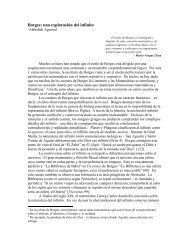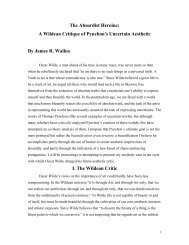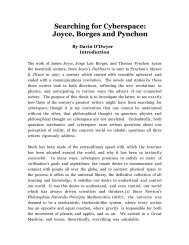And A Very Good Time It Was: A Short Life of ... - The Modern Word
And A Very Good Time It Was: A Short Life of ... - The Modern Word
And A Very Good Time It Was: A Short Life of ... - The Modern Word
Create successful ePaper yourself
Turn your PDF publications into a flip-book with our unique Google optimized e-Paper software.
With the help <strong>of</strong> the deadlines for <strong>The</strong> Egoist, Joyce made quick work on finishing and<br />
polishing Portrait. He also began work on his only play, Exiles, which would be published but<br />
performed only sporadically in his lifetime, and given a lowly status in his canon.<br />
Now beginning to gain the recognition he knew he deserved, he began seriously writing<br />
Ulysses. He had spent the previous seven years thinking about it, and would spend the next seven<br />
writing it. Taking place on June 16, 1904, it is separated into three parts, the first with three<br />
episodes, the second twelve, and the third three, with all but one <strong>of</strong> the eighteen (<strong>The</strong> Wandering<br />
Rocks, from the adventures <strong>of</strong> Jason and the Argonauts) having a parallel in the Odyssey.<br />
Part one has Stephen Dedalus at the Martello Tower with Buck Mulligan (Telemechus),<br />
teaching school and meeting with his boss (Nestor), and afterwards contemplating the universe on<br />
Sandymount Strand (Proteus).<br />
Part two introduces Leopold Bloom and his wife Molly (Calypso). Afterwards, Bloom takes a<br />
walk about Dublin and relaxaes in a public bath (Lotus-Eaters), attends his friend Paddy<br />
Dignam’s funeral (Hades), visits the <strong>of</strong>fices <strong>of</strong> the Freeman’s Journal as part <strong>of</strong> his job as an ad<br />
canvasser—where he just misses meeting Stephen (Aeolus), and wanders ravenously for some<br />
lunch (<strong>The</strong> Lestrygonians). We return to Stephen and Mulligan again who, with others, discuss<br />
Shakespeare at the National Library, where Bloom briefly appears towards the end (Scylla and<br />
Charybdis), and then enter the only non-Homeric episode, itself a set <strong>of</strong> eighteen vignettes from<br />
around Dublin that serve as a microcosm <strong>of</strong> the entire book (<strong>The</strong> Wandering Rocks). (Peter<br />
Costello makes the good point that Stephen disappears from the book now, just around the time<br />
Joyce and Nora would have been out walking that evening. 119 ) Bloom stops at a bar and musicroom<br />
(Sirens), has an unfortunate encounter with a violent nationalist and anti-Semite at a<br />
different restaurant (Cyclops), and has a nearly opposite and erotic encounter when he sees Gerty<br />
MacDowell (Nausicaa). We return to Stephen and his medical student friends at a hospital where<br />
a child is born (<strong>The</strong> Oxen <strong>of</strong> the Sun), and part two concludes in the long hallucinogenic<br />
adventure (it takes up nearly a quarter <strong>of</strong> the book) in Nighttown among the prostitutes where<br />
Bloom and Stephen finally meet, the latter rescuing Stephen from his equally inebriated friends<br />
(Circe).<br />
<strong>The</strong> third part consists <strong>of</strong> Stephen and Bloom’s exhausted visit to a cab-men’s shelter where<br />
the style (wordy and sloppy) matches their frame <strong>of</strong> mind (Eumeaus), followed by their walk to<br />
Bloom’s house on 7 Eccles Street, where Stephen continues on and Bloom goes to bed (<strong>It</strong>haca).<br />
<strong>The</strong> book finishes with Molly Bloom’s long soliloquy with her husband beside her (Penelope).<br />
“A perfectly ordinary day,” 120 Stuart Gilbert says.<br />
Many <strong>of</strong> the more anecdotal Homeric parallels have been pointed out only to deride the<br />
technique; one that comes to mind is “the cigar Bloom keeps brandishing in front <strong>of</strong> the citizen is<br />
like the spear Ulysses uses to blind the Cyclops.” 121 While these are bits <strong>of</strong> Joyce’s humor, and<br />
jokes on Homer, they are also, for a man who wanted to solemnize the everyday, “the<br />
ennoblement <strong>of</strong> the mock-heroic.” 122 In fact Joyce favored a mistaken etymology for the Greek <strong>of</strong><br />
Ulysses’ name: a combination <strong>of</strong> Outis (nobody) and Zeus (God). 123 <strong>The</strong> etymology may be<br />
wrong, the but the point has been made. Ellmann elaborates:<br />
For Bloom is a nobody—an advertisement canvasser who, apart from his family,<br />
has virtually no effect upon the life around him—yet there is god in him. By god<br />
Joyce does not intend Christianity; although Bloom has been generously baptized<br />
in both the Protestant Church and the Catholic Church, he is obviously not a<br />
Christian. Nor is he concerned with the conception <strong>of</strong> a personal god. <strong>The</strong> divine<br />
part <strong>of</strong> Bloom is simply his humanity—his assumption <strong>of</strong> a bond between<br />
himself and other created beings. 124





